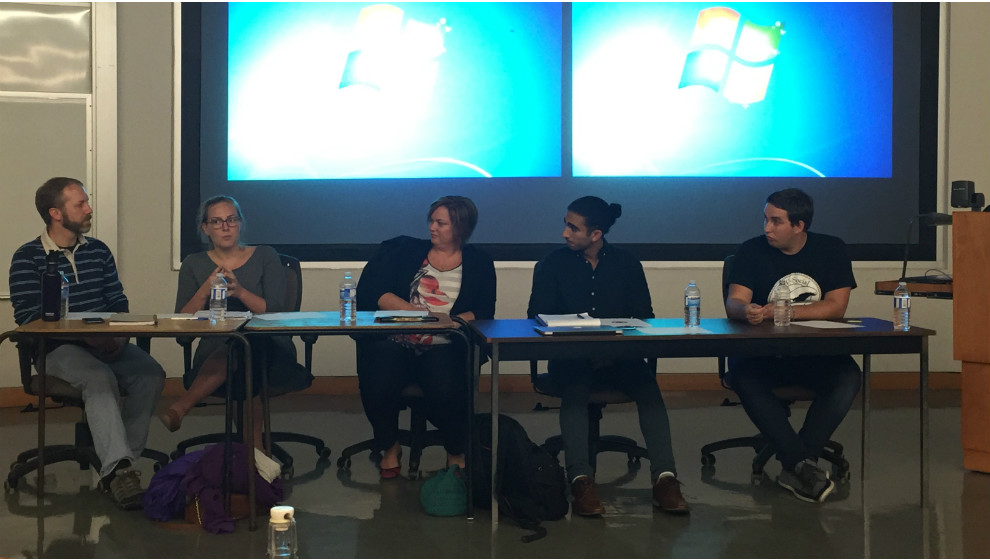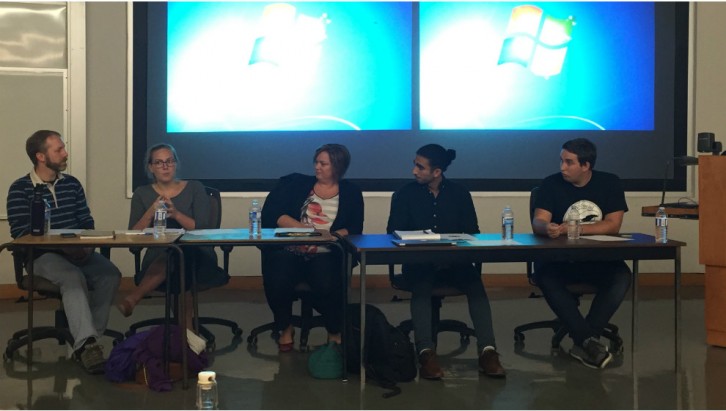Mental health
Accommodation for mental health: a work in progress
Dalhousie University students face challenges in receiving special academic accommodations for their mental health issues

caption
Jacob Hamilton sits with panel discussing mental health issues.
caption
Jacob Hamilton sits with panel discussing mental health issues.When Jacob Hamilton was in first year, he started struggling academically and saw his marks drop as a result of treatment-resistant depression and anxiety — a problem so serious that he says he had to drop out.
“I was starting to have my grades drop and I [had been] a straight-A student all the way through,” said Hamilton, who is now in third year. He said he wasn’t prepared to handle the challenges of dealing with his health issue.
For students dealing with mental health challenges, the process of getting a deadline extension, exam exception or excused absence can be daunting. Meeting deadlines for academic accommodation and discussing personal health issues with professors they barely know can be overwhelming — a situation the Dalhousie University’s counselling service says it is trying to ease.
Scheduling a meeting with the Advising and Access Services Centre at Dalhousie is the first step that students with mental illness must take in receiving extra help. The centre works with students who request accommodations relating to disabilities, religious obligations or any other characteristics protected under Human Rights legislation.
However, Hamilton said actually obtaining a note from the centre to excuse himself from classes can be difficult.
“I frequently forget to do it two weeks beforehand,” he said, referring to the academic accommodation deadline for exams. “If you have five professors for five exams you have to meet with every single prof — and we all know how busy profs and students are during exam period.”
Unlike getting a doctor’s note for a cold or sore throat, it can be difficult for students to approach professors with such personal issues.
Hamilton said he would sometimes get “so tired” of discussing the issue, especially “when I’m talking about it every day to a therapist or a new doctor and my parents.”
“You don’t want to open up your innermost weaknesses to your professor. It’s a huge barrier, getting them to understand,” said Hamilton.
He said he has had mostly understanding professors, even without a note, but he adds that some professors say they would rather receive medical documentation as students without mental health issues could take advantage of these permissions. Although Hamilton understand this, he feels too vulnerable to self-advocate at times.
“Whether it’s substance abuse or suicide attempts or cutting, you don’t want to talk about [it] with a stranger or somebody who may not understand because there still is a whole bunch of stigma,” he said.
According to the Canadian Mental Health Association, 20 per cent of Canadians will personally experience a mental health illness in their lifetime.
Dalhousie professor Fiona Ryan acknowledges it can be hard for students to talk about their mental health struggles. She tries to be as approachable as possible as well as provide resources for help in her course outline.
“I’m trying to come up with things that will make it easier for students throughout the term. So in case they do go through something, they have a chance throughout the term to build their mark,” said Ryan.
Joanne Mills, director of Counselling Services at Dalhousie, is increasing her communication with faculty and staff to ensure they know how to deal better with mental health issues. Starting on Oct. 26, Mills will be teaching and leading a series of workshops.
“I am doing a presentation on how to identify and refer students with mental health challenges,” said Mills.
Other than the Advising and Access Services Centre, the Counselling Services Centre at Dalhousie offers a limited number of free therapy sessions. Although the counsellors there don’t diagnose students, they support students with more acute phases of mental health issues.
“Often times, [with] those who have a short-term reaction, the counsellor will communicate with their faculty members on their behalf,” said Mills.
Hamilton thinks the process of obtaining exemptions and extensions could be made streamlined with quicker and easier access, such as online forms.
Both Hamilton and Mills hope that through more education and co-operation between faculty, students and university counsellors, students will receive the treatment that they require.
“it’s a human right and it’s protected in Nova Scotia,” said Mills.

